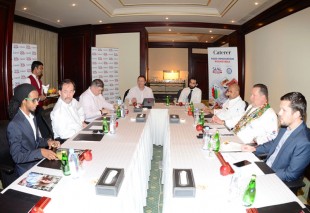

SIAL Food Innovation: Jeddah

International fast food and casual dining brands established themselves in Saudi Arabia because of their consistent standards and family-friendly appeal, according to the Jeddah round table panellists.
“Global franchises have the power to sustain quality. They think of everything. They have systems devised by professional people,” said food critic Rashed Islam of JeddahFood.com. “And for those fast-food pioneers, TV was hugely influential and generated excitement.”
Fast food is a trend that suits Saudis, said Thomas Gugler, president of The World Association of Chef’s Societies MEA.
He said: “They found drive-ins very convenient. The system was successful here, as it is hot.”
But not every food innovation translates well. “In the west, ready meals are successful,” added Gugler, “because it’s common for both the man and woman in a couple to work full-time. Here everyone has a home-cooked meal, and there are no ready meals.”
“There is a resistance to change,” noted Islam. “But change leads to the development of creativity and a culture of improvement… and the restaurant environment too. Many restaurants here are still in canteen form.”
Maurizio Panicali, executive chef at Rocco Forte Hotel, Jeddah, said of Saudi customers: “You have to start with something they know to win their trust. Then you can play and introduce new things.”
Daniel Mayor, executive chef at Crowne Plaza Jeddah, added: “Try to find basic food — the food that grandma cooks. But it’s hard to find someone who can demonstrate that and pass on the knowledge. It runs down the female line, which is a cultural problem. It’s the ladies who cook.”
“We need someone brave to publish a book of these family recipes,” suggested Hani Zain, celebrity chef and founder of Artistic Food Lab. “Otherwise it’s all in their heads, it’s not captured or written down.”
Gugler said: “If Saudi customers accept what they know from their childhood then restaurateurs should look to serve traditional Saudi food in a pepped up modern way, but with flavours that granny would like.
“There have been attempts, but they’ve been high-end, and they’ve concentrated on the décor and forgotten the food. They’ve employed foreign chefs who don’t know the soul of the food. I’m lucky to have been to Saudi houses and seen Saudi women cooking.”
“But it’s impossible to hire ladies to cook here,” interrupted Panicali.
The panel accepted that the cultural acceptance of local people — male or female — to become chefs or waiters is very low — because those roles imply service. Zain said his father refused to visit his restaurant for many years.
“It’s a big problem,” admitted Gugler. “In Kuwait or Dubai they’re much more open, and they have professional associations, which give chefs a base to modernise their careers and develop their careers.But the basics of even having a culinary school is not available all over Saudi — at least not ones I’d rate as good.”
Food supply can also be problematic, the panellists reported. Certain products cannot be imported to the consistency and quality required — either because of logistical challenges on import rules and regulations. Panicali complained: “In other countries suppliers knock on your door every day. But here you can’t get hold of them. Or they bring you a brochure, you choose something from it, and then they say they don’t have it!”
“It has to come from the top,” insisted Mayor. “Restrictions have to be lifted and we need better systems if we want to increase the quality of our food.”
A WORD FROM OUR SPONSOR...
Rizwan Mustafa, group marketing director — Middle East & ASEAN, SIAL Middle East says: “Innovation is the DNA of SIAL events worldwide and the Middle East is no exception. This is why SIAL Middle East partnered with Caterer Middle East to discuss food innovation in the region with a series of roundtables in Doha, Riyadh and Jeddah.
“Participants in each city offered their unique perspectives on innovation, including the challenges that hamper it. One of the common themes emerging from these discussions was the problem of sourcing the right ingredients to achieve authenticity. The limited availability of suppliers willing to import specific ingredients is a major hindrance and multiple channels of import are hence necessary to ensure that horeca and foodservice have a consistent supply of required ingredients.
“SIAL Middle East promotes innovation in the food, beverage and hospitality industry. It provides an ideal platform for culinary professionals to act as influencers and push distributors and suppliers within their respective regions to import their required products.
“In order to showcase the most innovative products in the region, SIAL Middle East features a dedicated zone within the event called SIAL Innovation, and an associated awards programme. Last year, out of the original 142 food and beverage products entered, 42 were shortlisted, out of which 10 finalists were selected. Eventually Camelait Premium Camel Ice Cream by Al Ain Dairy was named the Gold Award Winner.
“Winners from all SIAL events in the past year will be present in person at SIAL Middle East, so visitors will be able to taste and try food products that have won the prestigious Gold Award in Paris, China, Canada, Manila and Jakarta.”
SIAL Middle East 2015 takes place on December 7-9, at the Abu Dhabi National Exhibition Centre. For more information, visit sialme.com.